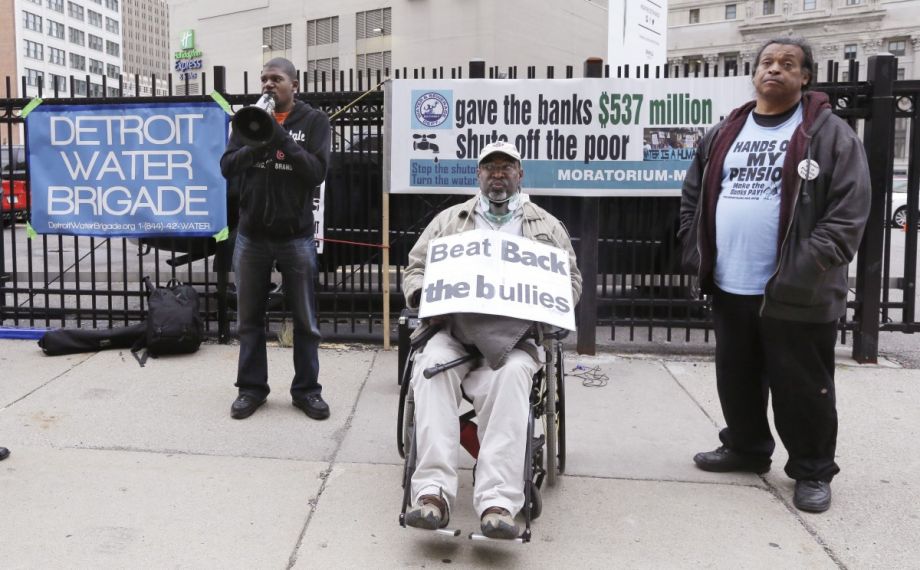While indicators like unemployment and gas prices have shown promising signs in recent months, stark inequality remains as a key feature of the American economy. In the coming year, here are the stories to follow if you want to know whether things are getting better or worse for low-income, urban communities.
Utilities Will Take A Bigger Chunk Out of Household Budgets
Last spring, the Detroit Water and Sewerage Department made national headlines when it made an aggressive move to recoup more than $90 million from more than 90,000 customers by shutting off service to those who were more than 60 days late on their bill.
Detroit’s challenge isn’t isolated. The rising cost of water has become a struggle for low-income people in cities nationwide. While families scramble to keep up with monthly payments, water utilities have struggled to balance their customer’s rights to clean water with their own bottom lines.
“In addition to the need for infrastructure replacement and big investments required there, we are now coming face to face with a social problem of big dimensions, namely the hardship that these investments are going to impose on customers at the bottom of the income spectrum,” Tom Curtis, the head of governmental affairs for the American Water Works Association told Governing in early December.
Gas and electricity utility bills have also taken a larger chunk out of monthly budgets. In Pennsylvania, 23,213 households lack heat this winter, compared to 19,653 in 2013 — an 18 percent increase. Keep an eye on pilot programs like LIFT-UP which seek to ease the burden facing debt-laden households.
More Publicly Subsidized Tenants Will Rely on a Private-Sector Landlord
With direct expenditures from the federal government in free fall since 2000, The Department of Housing and Urban Development (HUD) and local housing authorities are increasingly turning to private investors to cover some of the $26 billion in renovations and repairs needed to keep public housing livable. In 2014, HUD Secretary Julián Castro successfully advocated for the increase in the number of units available to be eligible for the Rental Assistance Demonstration project (RAD). This program allows local housing authorities to turn agency-run developments into Section 8 rentals and mortgage properties to private developers who receive rent subsidies in exchange for taking on the cost of running the housing developments.
While HUD has advocated for strong tenant protections, detractors fear gradual rent increases and displacement.
In another creative financing project, The New York City Housing Authority recently sold a 50 percent stake to private developers. While the move will help keep NYCHA solvent, there is a fear that this maneuvering will result in a loss of affordable, public housing units in the long term.
“I don’t know what’s going to happen 30 years from now. … Things change. Priorities change. That’s my fear about what’s at risk.” says New York City Councilwoman Rosie Mendez, who I recently interviewed about the sale. Advocates and tenants must keep an eye on their new landlords to ensure that the promises of increased efficiencies and better conditions are realized without losses to critical affordable housing stock.
Small Businesses Will Find Ways to Grow
As the Harvard Business Review notes, small business growth has not been the driving factor in the latest economic recovery. Unlike other past recoveries, this upturn has primarily been led by the government and big business. In order for the unemployment rate to make that final push to five percent, they argue that small businesses are going to have to be able to expand and create more low-wage jobs.
Thankfully, there are bright spots on the horizon: Earlier this month I wrote how San Francisco has designed a new web portal making it simpler and more efficient than ever to open a small businesses there. (Other cities should follow follow their lead). The maker movement has spurned and supported an uptick in small-scale urban manufacturing. Community Development Financial Institutions (CDFIs) are exploring more ways to connect with minority business owners in low-income communities.
Cities will Get Creative about Affordable Housing
Cities exclusively for the 1 percent aren’t sustainable. In New York, San Francisco, Washington D.C. and others where housing costs have skyrocketed, policymakers need to cram their affordable housing toolbox with strategies like land banking, land trusts, and inclusionary zoning.
They should consider these tools thoughtfully and with sensitivity. “We need to respect the agency of local residents and be sure that we are talking about issues in a way that reflect their perspectives and concerns, balancing both the need to support community pride and assets, and clearly articulating the challenges facing these neighborhoods,” write Jason Reece and Joe Kriesberg in Shelterforce. Too often vulnerable communities are strategized for and not with. Out with the old, in with the new in 2015.
The Equity Factor is made possible with the support of the Surdna Foundation.

Alexis Stephens was Next City’s 2014-2015 equitable cities fellow. She’s written about housing, pop culture, global music subcultures, and more for publications like Shelterforce, Rolling Stone, SPIN, and MTV Iggy. She has a B.A. in urban studies from Barnard College and an M.S. in historic preservation from the University of Pennsylvania.

















